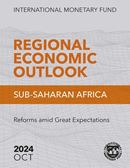This web page provides information in on the activities of the Office, views of the IMF staff, and the relations between Chad and the IMF. Additional information can be found on the Chad and IMF country page, including official IMF reports and Executive Board documents in English and French that deal with Chad.
At a Glance
- Current IMF membership: 191 countries
- Chad joined the Fund in July 10, 1963.
- Total Quotas: SDR 140.2 Million
- Loans outstanding: PRGF Arrangements SDR 26.43 Million
- Last Article IV Consultation: The Article IV Consultation staff report was discussed by the Executive Board on July 3, 2019 (IMF Country Report No. 19/258, published on July 31, 2019)
Office Activities
-
December 2019 REO Presentation
Press articles related to the Presentation (in French)
December 30, 2019
-
December 2019 REO Presentation
Speech by Ahmed Alkhoudar Ali Fadel, Secretary of State for Finance and Budget (in French)
December 19, 2019
-
April 2019 REO Presentation: Opening Speech by Mr. Allali, Minister of Finance and Budget
Video in French
June 17, 2019
Chad and the IMF
-
Growth in Sub-Saharan Africa is Diverging
November 14, 2024
Stagnating incomes in sub-Saharan Africa’s resource-intensive economies necessitate more effective fiscal management and broad-based structural reforms.
-
IMF Staff Completes 2024 Article IV Consultation Mission to Chad
October 15, 2024
An International Monetary Fund (IMF) team, led by Mr. Édouard Martin, Mission Chief for Chad, visited N’Djamena to hold discussions on the 2024 Article IV consultation from October 3–15, 2024
-
May 31, 2024
Series:Country Report No. 2024/144
-
IMF Executive Board Concludes 2024 Article IV Consultation with Gabon
May 28, 2024
On May 24, 2024, the Executive Board of the International Monetary Fund (IMF) concluded the Article IV consultation with Gabon.
-
April 17, 2024
Series:Country Report No. 2024/090
Regional Economic Outlook
October 25, 2024
Sub-Saharan African countries are implementing difficult and much needed reforms to restore macroeconomic stability, and while overall imbalances have started to narrow, the picture is varied. Policymakers face three main hurdles. First, regional growth, at a projected 3.6 percent in 2024, is generally subdued and uneven, although it is expected to recover modestly next year to 4.2 percent. Second, financing conditions continue to be tight. Third, the complex interplay of poverty, scarce opportunities, and weak governance--compounded by a higher cost of living and short-term hardships linked to macroeconomic adjustment--are fueling social frustration. Within this environment, policymakers face a difficult balancing act in striving for macroeconomic stability while also working to address development needs and ensure that reforms are socially and politically acceptable. Protecting the most vulnerable from the costs of adjustment and realizing reforms that create sufficient jobs will be critical to mobilize public support.
Read the Report
Fraudulent Scam Emails Using the Name of the IMF
We would like to bring to the notice of the general public that several variants of financial scam letters purporting to be sanctioned by the International Monetary Fund (IMF) or authored by high ranking IMF officials are currently in circulation, and may appear on official letterhead containing the IMF logo. The scam letters instruct potential victims to contact the IMF for issuance of a “Certificate of International Capital Transfer” or other forms of approval, to enable them receives large sums of monies as beneficiaries. The contact e-mail information is always BOGUS and unsuspecting individuals are then requested to send their personal banking details which the scammers utilize for their fraudulent activities.For more information please see Fraudulent Scam Emails Using the Name of the IMF
Departmental Papers on Africa





